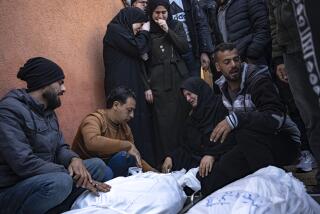Violence Claims Lives of 100 Iraqis
- Share via
BAGHDAD — Waves of killing engulfed this capital city and surrounding areas Monday as bombings, shootings and sectarian executions left more than 100 Iraqis dead.
The death toll was high even by the Iraqi capital’s standards. It included 20 killed by two synchronized car bombs in east Baghdad, and 64 men whose mutilated bodies were found on roadsides and in empty lots and drainage ditches in and around the capital.
The U.S. military also reported that seven of its troops had died in combat Sunday. The deaths brought to at least 59 the number of service personnel killed during the first 15 days of the month -- a rate higher than any time since January 2005, when U.S. forces battled insurgents before the country’s elections.
The violence came on the heels of a campaign of vengeance executions that left 80 Sunni Arabs dead over the weekend near Balad, a mostly Shiite enclave amid Sunni villages about 50 miles north of the capital.
Shiite Muslim gunmen allegedly linked to militias hunted down and shot dead Sunni Arab men in the city, to avenge the beheadings of a group of Shiite farmers on Friday.
Some of the bodies continued to lie unclaimed on the streets of Balad. Overnight, mortar rounds struck the town, killing five, and Shiite militiamen retaliated by attacking Sunni districts, officials and residents said.
U.S. soldiers continued a lockdown on the area, arresting police officers from a Sunni village near Balad.
Gunfire and explosions shook much of the capital throughout the day, as a sandstorm added to the gloom.
The car bombs in east Baghdad’s Ur district exploded near a funeral tent and a market crowded with shoppers stocking up for Iftar, the breaking of the dawn-to-dusk fast during the Muslim holy month of Ramadan. In addition to the 20 killed, 17 were injured in the attack.
Another car bomb attack near a bank in Baghdad killed 10 Iraqis and injured 45, officials said.
Shootouts between government forces and insurgents erupted in several Baghdad neighborhoods, killing one Iraqi soldier and three civilians, and injuring five others. Two U.S. soldiers also were injured in the battles.
Insurgents opened fire on security guards on the capital’s outskirts, killing one and injuring four, while six roadside bombs targeting Iraqi police and soldiers in and around Baghdad killed two and injured 18.
The U.S. casualties Sunday included one soldier killed in Baghdad that night when his vehicle struck a roadside bomb. Earlier, two U.S. soldiers attached to the 3rd Brigade of the 25th Infantry Division were killed and two others wounded in fighting near the northern city of Kirkuk. Two soldiers assigned to the 3rd Brigade of the 82nd Airborne Division were killed in combat in Sunni-dominated Salahuddin province, and two Marines died in combat in western Iraq.
The latest violence comes amid rising political tensions over issues of regional autonomy, the power of the central government, control over oil resources and Iraqi national identity.
Minority Sunni Arabs, who held power under Saddam Hussein, are waging an insurgency against the Shiite- and Kurdish-dominated government as well as its U.S. backer. Ascendant Shiites, meanwhile, struggle to enforce their will both through politics and the gun, killing dozens of Sunnis every night.
A highly publicized Oct. 21 conference on national reconciliation, aimed at reducing tensions among the country’s communities, has been postponed until further notice.
Saad Muttalibi, an advisor to the Ministry of State for Dialogue and Reconciliation, cited “technicalities” for the delay but acknowledged that the country’s factions appeared to be moving away from discussion and compromise.
“It doesn’t mean we have to give up,” he said in an interview Monday.
“The cost of reconciliation is very high. Some corners are afraid of it. The road ahead is very long.”
In other developments, a court trying Hussein and seven others in the 1980s slayings of 148 Shiite Muslims from the village of Dujayl announced that it would hold a Nov. 5 session at which it was expected to announce a verdict.
“Most likely they will reach a verdict after finishing checking some minor things,” said Jaafar Mousawi, the lead prosecutor in the case.
*
Times staff writer Doug Smith and special correspondents in Baghdad and Samarra contributed to this report.
More to Read
Sign up for Essential California
The most important California stories and recommendations in your inbox every morning.
You may occasionally receive promotional content from the Los Angeles Times.









